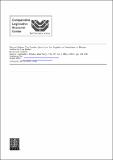| dc.description.abstract |
In the past decade 21 countries have adopted gender quota laws that require between 20% and 50% of all legislative candidates to be women. What explains the adoption of these laws? I argue that three factors make politicians more likely to adopt gender quota laws. First, electoral uncertainty creates an opportunity for internal party reform that factions within a party can exploit their advantage. Second, the courts play an important role because of the centrality of the issue of equal protection under the law to gender quotas. Finally, cross-partisan mobilization among female legislators raises the costs of opposing such legislation by drawing public attention to it. I examine these three claims with regard to Mexico, where the federal congress passed a 30% gender quota law in 2002. |

